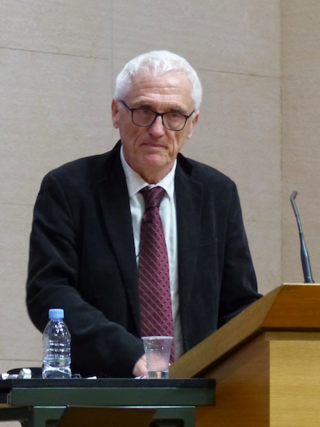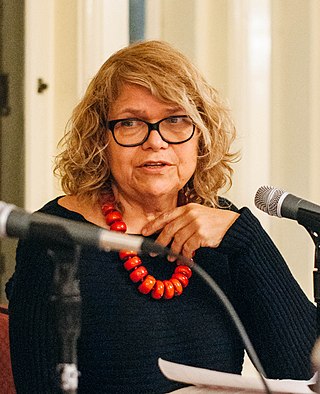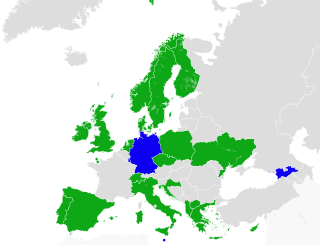
National Armed Forces was a Polish right-wing underground military organization of the National Democracy operating from 1942. During World War II, NSZ troops fought against Nazi Germany and communist partisans. There were also cases of fights with the Home Army.

Irena Stanisława Sendler (née Krzyżanowska), also referred to as Irena Sendlerowa in Poland, nom de guerreJolanta, was a Polish humanitarian, social worker, and nurse who served in the Polish Underground Resistance during World War II in German-occupied Warsaw. From October 1943 she was head of the children's section of Żegota, the Polish Council to Aid Jews.

Gazeta Wyborcza is a Polish nationwide daily newspaper based in Warsaw, Poland. It was launched on 8 May 1989 on the basis of the Polish Round Table Agreement and as a press organ of the trade union "Solidarity" in the election campaign before the Contract Sejm. Initially created to cover Poland's first partially free parliamentary elections, it rapidly grew into a major publication, reaching a circulation of over 500,000 copies at its peak in the 1990s.

Telewizja Polska S.A., also known in English as Polish Television, is a public service broadcaster in Poland, founded in 1952. It is the oldest and largest Polish television network.
Marek Jan Chodakiewicz is a Polish-American historian specializing in Central European history of the 19th and 20th centuries. He teaches at the Patrick Henry College and at the Institute of World Politics. He has been described as conservative and nationalistic, and his attitude towards minorities has been widely criticized.

Jan Tomasz Gross is a Polish-American sociologist and historian. He is the Norman B. Tomlinson '16 and '48 Professor of War and Society emeritus and professor of history emeritus at Princeton University.

Robert Witold Makłowicz is a Polish food critic, journalist, historian and television personality, notable as a promoter of the Polish cuisine and slow food. He is best known for his series of culinary TV programs Makłowicz w podróży.

Black Volga refers to an urban legend widespread in Poland, Romania, Hungary, Russia, Belarus, Ukraine, Greece and Mongolia, mainly in the 1960s and 1970s. The legend refers to a black GAZ-21 or GAZ-24 that was allegedly used to abduct and murder people. According to different versions, it was driven by communist secret police, Russian mafia, Satanists or Satan himself. The car is described as having white wheel rims, white curtains or other white elements.

Fear: Anti-Semitism in Poland after Auschwitz: An Essay in Historical Interpretation, is a book by Jan T. Gross, published by Random House and Princeton University Press in 2006. An edited Polish version was published in 2008 by Znak Publishers in Kraków as Strach: antysemityzm w Polsce tuż po wojnie: historia moralnej zapaści. In the book, Gross explores the issues concerning incidents of post-war anti-Jewish violence in Poland, with particular focus on the 1946 Kielce pogrom. Fear has received international attention and reviews in major newspapers; receiving both praise and criticism.

Piotr Gontarczyk is a Polish historian with a doctorate in history and political science.
Jan Kobylański was a Polish-Paraguayan businessman. He was the founder of the Union of Polish Associations and Organizations in Latin America the largest Polish immigrant organization of South America. He was also a founder of one of the world's largest companies involved in editing postage stamps, and coins mintage. He has written books on philately, as well as on the mediation policy of the Roman Curia. He was formerly the honorary consul of Poland to Paraguay, and the honorary consul of Paraguay to Santa Cruz de Tenerife, Spain.

Napoleonka (Polish:[napɔlɛˈɔnka] ; colloquially kremówka, is a Polish type of cream pie. It is made of two layers of puff pastry, filled with whipped cream, crème pâtissière or just thick milk kissel enriched with melted butter, or sometimes filled with egg white cream. It is usually sprinkled with powdered sugar but it also can be decorated with cream or covered with a layer of icing.

The Talking Dog was a cultural event held monthly at the Piękny Pies club in Kraków from the second half of 2010 until March 2015, described as "an anthropological talking magazine". It was led by Piotr Bikont and Maciej Piotr Prus. Editorial staff of the magazine included both masters of the ceremony, and also Aleksander Janicki, Edward Pasewicz, Andrzej Pilichowski Ragno, Jorgos Skolias and Marcin Świetlicki. Since the premiere, Gadający Pies had 31 editions.
The Ryszard Kapuściński Award is a major annual Polish international literary prize, the most important distinction in the genre of literary reportage.

Anna Bikont is a Polish journalist for the Gazeta Wyborcza newspaper in Warsaw. She is the author of several books, including My z Jedwabnego (2004) about the 1941 Jedwabne pogrom, which was published in English as The Crime and the Silence: Confronting the Massacre of Jews in Wartime Jedwabne (2015). The French edition, Le crime et le silence, won the European Book Prize in 2011.

Grzegorz Michał Braun is a Polish politician. He served as a member of the Sejm for Rzeszów from 2019 to 2024. He has been Chairman of the Confederation of the Polish Crown since 2019 and a member of the European Parliament (MEP) for Lesser Poland and Świętokrzyskie since 2024.

Possession of most drugs for recreational use, including cannabis, is illegal in Poland. It was classified as a narcotic in 1951 but it was not until 1997 that possession and use of the drug became a crime. Since 2011, prosecutors have the discretion to drop the charges if the quantity of drugs seized is only a small amount. The medical use of cannabis was legalized in 2018.
Piotr Ibrahim Kalwas is a Polish novelist, journalist, and twice nominated for the Nike Literary Award.
Krzysztof Jasiewicz is a Polish historian specializing in the Polish-Soviet Union relations. He is a professor at the Political Studies Institute of the Polish Academy of Sciences.

OKO.press is a Polish investigative journalism website created on 15 June 2016. The name is a word play on oko, Polish for eye, and an abbreviation for "Ośrodek Kontroli Obywatelskiej".















